the President is a person who occupies the highest position in Brazilian politics, representing the greatest authority existing in our country. Whoever is in the role receives numerous responsibilities mentioned in the federal Constitution. The president in Brazil is chosen by a popular election for a term of four years with the possibility of reelection.
accessalso: Military dictatorship — period when the population had no right to elect the president
Summary about the president of the republic
- The presidency is the highest and most authoritative office in our politics.
- Its functions are assigned in the Federal Constitution of 1988.
- Their term of office is four years and can be repeated for another four years.
- The election is carried out by popular vote, requiring at least more than 50% of the valid votes to be obtained.
What is the president?
The presidency is a political position temporarily held by a person chosen for it. In Brazil, the president is the highest authority and responsible for the administration of the nation
. The president is also the chief executive (one of the Tthree Poders).Whoever is in the presidency in Brazil is considered as head of government and head of state, that is, the person acts directly in making decisions. decisions related to the administration of the country and also as a representative of the nation in diplomatic events inside and outside our borders. This is because Brazil is a presidential republic.
If it were a parliamentary republic, the president would only be head of state, as the head of government would be the prime minister (the prime minister). The presidency in Brazil is a position with four-year term. There is the possibility of reelection, totaling eight years of government. After that, the position must be taken over by someone else.
What does the president do?
In Brazil, the functions of the president were described in the Constitution of 1988, in the 84th article. One of the most basic functions is sanction (put into force) laws passed by deputies and senators. The president can also veto a law passed by those authorities.
In addition, the president can propose that laws be created. The proposal of a law must be delivered to deputies and senators so that they can discuss, regulate and approve or not the proposal. It is important to mention that a law proposed by the president does not have to be approved.
The highest authority of Brazilian politics may also implement measures on a provisional basis through a Provisional Measure. This provision lasts for 60 days and then must be debated by deputies and senators with a view to whether or not it will be enacted into law.
The administration of the country and the matters most relevant to national interests is done by ministries, bodies that take care of a specific strategic issue. That is the role of the president appoint the people who will head the ministries, the ministers. In theory, this presidential choice should take into account the technical capabilities person for the task to which it will be assigned.
The president also appoints the commanders of the Navy, Air Force and Army, the three forces that make up the Armed Forces of our country. This is because, according to our Constitution, the president is considered the commander-in-chief of the Armed Forces, and the military is subordinate to this command.
Those who hold the position of presidency also make efforts to defend Brazil's interests in all areas and must represent our country internationally, in addition to signing agreements and treaties international.
accessalso: Deodoro da Fonseca — the first president of Brazil
How is the president chosen?
In Brazil, the president is chosen by electionpopular held every four years. There are some criteria required of anyone interested in running for the presidency of Brazil. Are they:
- be Brazilian (a) born (a);
- be at least 35 years old;
- be affiliated with a political party;
- reside in Brazil;
- enjoy their political rights.
The election for the choice of president requires that whoever wins get more than 50% of the votes, and, if this does not happen in the first round, the two most voted decide the dispute in a second round. Whoever wins is elected for a four-year term and can run for re-election for a total of eight years of government.
If a president dies, resigns or suffers impeachment, the Brazilian Constitution stipulates that he must be succeeded by (in order of succession): vice president, president of the Chamber of Deputies, president of the Senate or president of the Supreme Court Federal.



